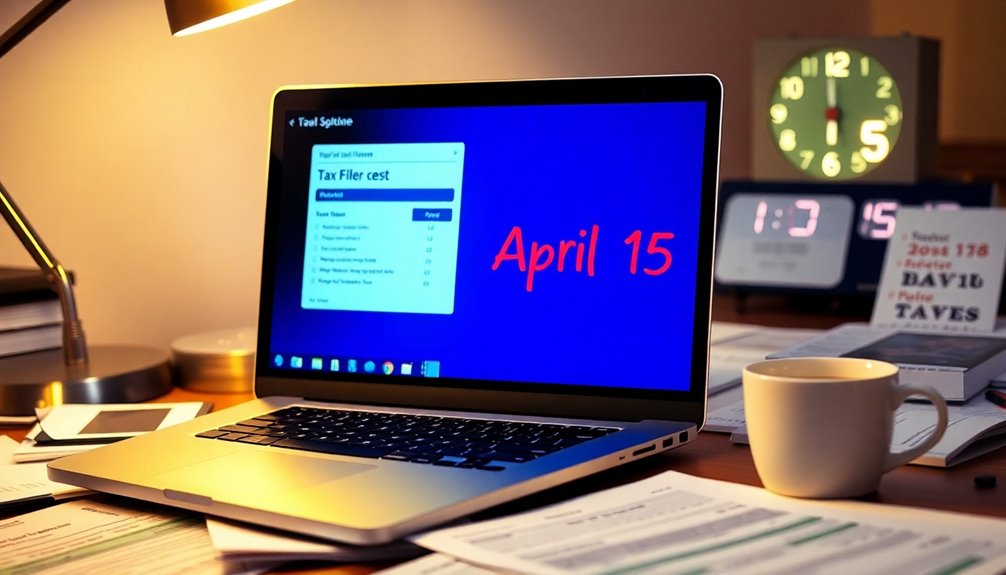Yes, taxes are due by midnight on April 15 in your respective time zone. If April 15 lands on a weekend or a holiday, the deadline shifts to the next business day. You'll need to submit your individual federal income tax returns and any payments you owe by that deadline to avoid penalties. If you're self-employed or earn income from sources like rentals, quarterly estimated taxes are also due on that date. To avoid issues, ensure your filing and payment are submitted on time. There's more to know about extensions and different circumstances affecting your deadline, too.
Key Takeaways
- Taxes are due by midnight on April 15 in respective time zones for the previous tax year.
- If April 15 falls on a weekend or holiday, the deadline shifts to the next business day.
- E-filed returns are accepted until midnight on April 15, 2024, while mailed returns must be postmarked by that date.
- IRA contributions for the previous tax year must also be made by April 15 to be eligible.
- Payments of taxes owed must be completed by April 15 to avoid penalties, even if an extension is filed.
General Tax Filing Deadline

When it comes to the general tax filing deadline, you need to know that taxes are due by midnight on April 15 in your time zone. If April 15 lands on a Saturday, Sunday, or a legal holiday, don't worry—the deadline shifts to the next business day. This date applies to your individual federal income tax returns and tax payments, and it's also when you must make IRA contributions for the previous tax year. Additionally, e-filed returns are accepted until midnight on April 15, 2024, making it a convenient option for timely submissions. If you're filing by mail, your return is considered on time if it's postmarked by the due date. For online filings, make sure your submission is transmitted by midnight on Tax Day. Electronic tax payments can also help if you need to extend your filing deadline.
If you find you need more time, you can file for a six-month extension using Form 4868 by the original deadline. Just remember, the extended deadline is October 15, but this doesn't give you extra time to pay—interest and penalties can apply if you don't pay your taxes by April 15.
Make sure you're aware of these important deadlines to avoid any unnecessary issues!
Quarterly Estimated Tax Payments

Quarterly estimated tax payments are essential for certain individuals and businesses to avoid penalties and interest charges. If you're self-employed, a landlord, an independent contractor, or earn income from investments, you likely need to make these payments.
You must anticipate a tax liability of over $1,000 ($500 for corporations) after accounting for withholding and refundable credits. To determine if you need to pay, ensure your withholding is less than 90% of your current year's tax liability or 100% of last year's. Use Form 1040-ES for individuals or Form 1120-W for corporations to calculate your estimated tax based on your income and deductions. Estimated payments are required if your tax liability exceeds $1,000.
Payments are due on specific dates: April 15, June 17, September 16, and January 15 of the following year. If a due date falls on a weekend or holiday, the payment is due the next business day.
You can pay online, by phone, or even by mail. Keep in mind that late payments may incur penalties and interest, so timely payments are vital, even if you expect no tax liability at the end of the year.
For more details, refer to IRS Publication 505.
Extensions and Late Filings

Taxpayers often find themselves in a bind when they miss the April 15 deadline for filing their returns. If you realize you won't make it, you can still request an extension using IRS Form 4868. Just remember, this request must be submitted by April 15, the same day your taxes are originally due. Filing this form gives you an additional six months to file, pushing your deadline to October 15.
However, don't forget that the extension only applies to filing, not payments. You still need to pay any taxes owed by April 15 to avoid penalties. If you miss both the filing and the payment deadlines, you could face a failure to file penalty and additional interest on the unpaid amount. Additionally, if you're an expat, you have an automatic two-month extension if outside the US, which extends your filing deadline to June 15.
If you do miss the deadline, it's important to file your return as soon as possible. The sooner you act, the more you can minimize penalties and interest.
If you're unable to pay your tax bill right away, consider requesting an IRS payment plan to pay in installments. Keep in mind, there are no extensions beyond the October 15 deadline for individual tax returns.
Special Circumstances and Exceptions

Tax deadlines aren't set in stone; they can shift due to various special circumstances and exceptions. If April 15 lands on a weekend or holiday, your deadline automatically moves to the next business day. For instance, if Emancipation Day in Washington, D.C. falls on April 16, you'll have until the next weekday to file.
If you're in the military and stationed outside the U.S. or Puerto Rico, you get an extension until July 1. Serving in a combat zone? You receive an extra 15 days or a full year from your original due date. Spouses of those military members also qualify for these extensions.
For U.S. citizens living abroad on April 15, you have an automatic extension to June 15 to file, though you still need to pay any expected taxes by the original deadline. You can further extend your filing deadline to October 15 by submitting Form 4868. In addition, it's important to note that the Tax Day for 2024 is set for April 15, based on 2023 income, so plan accordingly.
Finally, the IRS may grant extensions due to disasters like hurricanes or pandemics. Document your situation carefully, as these extensions aim to ease your tax burden during extraordinary circumstances.
Filing and Payment Methods

When it comes to filing your taxes, you have a couple of options to choose from. You can opt for electronic filing (e-file), which allows you to submit your tax return over the Internet. This method reduces processing time and errors, and you can access it through online services, software, or tax professionals.
However, keep in mind that e-filing isn't available for all complex returns. Alternatively, you can file a paper return, but this method is slower and more prone to errors, taking about 4-8 weeks for refund processing.
For payment, you can use direct debit when e-filing, allowing for easy Electronic Funds Withdrawal from your bank account. If you prefer to pay by check, just remember to include a payment voucher. Additionally, you can schedule payments for up to 365 days in advance using the Electronic Federal Tax Payment System (EFTPS).
Payments can also be made using credit or debit cards through approved providers, but expect some fees. Other options like the Electronic Federal Tax Payment System (EFTPS) let you pay online or by phone without any fees.
If you need convenience, cash payments are available at participating retail stores. Choose the method that best suits your needs to ensure a smooth filing and payment experience.
Frequently Asked Questions
What Happens if I Miss the April 15 Deadline?
If you miss the April 15 deadline, you face penalties for both late filing and late payment if you owe taxes.
The late filing penalty starts at 5% per month of unpaid taxes, maxing out at 25%. Late payment penalties add another 0.5% per month, also capping at 25%.
To minimize damage, file your return as soon as possible, even if you can't pay the full amount, and consider an IRS payment plan.
Can I File My Taxes Early?
Yes, you can file your taxes early! Starting in mid- to late January, you're able to prepare and submit your tax return electronically or using tax software.
Filing early not only speeds up your refund process but also gives you time to gather necessary documents and identify potential deductions.
Plus, it helps protect against identity theft and reduces stress as you approach the tax season deadline.
How Do I Know if I Need to File?
To know if you need to file your taxes, check your income against the filing thresholds based on your age and status.
If you're self-employed or have certain types of income, like HSA distributions, you'll likely need to file.
Dependents should also consider their income levels.
If any of these situations apply to you, it's best to prepare your tax return to avoid penalties and ensure compliance.
Are All States' Tax Deadlines the Same?
No, not all states' tax deadlines are the same.
While many states follow the federal deadline of April 15, some have different dates. For example, Delaware's deadline is May 2, and Louisiana's is May 15.
States with no personal income tax, like Texas and Florida, don't have a state income tax deadline at all.
To be sure, check your state revenue department for the specific due dates that apply to you.
What Forms Do I Need to File Taxes?
To file your taxes, you'll typically need Form 1040, which reports your income and calculates your tax.
If you're self-employed, include Schedule C to report your business income.
For itemized deductions, use Schedule A.
If you have investment income, you may need Schedule D and relevant 1099 forms.
Remember, if you need to amend a return, you'll use Form 1040-X.
Gather these forms based on your financial situation to ensure accurate filing.
Conclusion
In conclusion, while taxes are generally due by midnight on April 15, it's essential to stay aware of deadlines and options. If you can't meet this date, consider filing for an extension, but remember that any owed taxes still need to be paid on time to avoid penalties. Always check for special circumstances that might apply to you and choose the right filing and payment methods to make the process smoother. Stay informed and file wisely!









